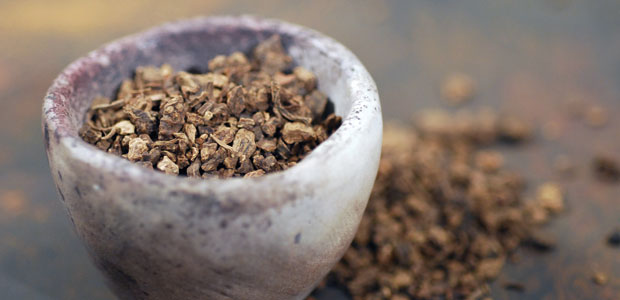Advertisement
Valerian
The insomniac's friend

Though its characteristic smell may ward off many, valerian (Valeriana officinalis) is a classic herb worth knowing. Its peculiar fragrance was once the base of a perfume called eau de valeriane, which was popular among the pre-Revolution French nobility.
Today, valerian root continues to be the primary herb used, either alone or in combination, for insomnia and nervousness.
The ancient Greeks used valerian, and British herbalist Nicolas Culpeper (1616 to 1654) noted that valerian is excellent against nervous affections, such as head-aches, trembling, palpitations, vapours, and hysteric complaints.
Current Research
The historical therapeutic benefits of valerian have been confirmed in many clinical trials. Lets look at a few of the more recent ones.
A German study published in the journal Phytotherapy Research in 2007 evaluated a combination extract derived from valerian and hops. The product was found to be more effective than placebo in reducing the time needed to fall asleep in patients with insomnia.
A Canadian study published in the journal Sleep in 2005 is of special interest. Directed by researchers at University Laval in Quebec, in collaboration with nine sleep disorders centres throughout the United States, this study meets the gold standard in terms of methodology in that it was conducted as a randomized, case-control study. For 28 days, the efficacy of an over-the-counter drug or of a combination of valerian and hops extracts were compared to placebo. Both treatments showed a significant though modest hypnotic effect, appeared safe, and did not produce rebound insomnia when they were discontinued at the end of the study.
Is Valerian Safe to Use?
Researchers have further evaluated the impact of valerian on the major enzymes responsible for metabolizing medication. A 2005 study published in Clinical Pharmacology and Therapeutics reported that goldenseal and kava did interact with these enzymes, but valerian had no measurable herb-drug interaction. Nevertheless, it is advisable that you tell your health care practitioner that you are taking valerian if you also take prescription medication.
The Pros and Cons
A 1985 study published in the Archives of Toxicology led many people to believe that valerian may cause cell mutation and cancer. The study showed that valepotriates (alkaloids isolated from valerian, considered to be the tranquilizing constituent of the herb) caused chromosome malformations in Salmonella bacteria. Countering these results, in 1994 the Journal of Ethnopharmacology published the results of a study in which valerian extract was administered to rats on a daily basis. Over three generations (from expectant mothers to the offspring of their offspring), no malformations were found.
Anecdotal cases of liver toxicity involving a combination product called Sleep-Qik, composed of valerian, hyoscine (an alkaloid), and cyproheptadine (an antihistamine), were reported in 1995 in Hong Kong. Using the same product at three times the recommended dosage, researchers failed to reproduce the toxicity in 23 patients. The two ingredients with which valerian was combined in Sleep-Qik may theoretically cause liver toxicity, but valerian will not.
Valerian is a safe and useful herb for anxiety and insomnia. Combinations of herbs containing valerian may be more effective than valerian alone.
Better Sleep and Better Sex
Valerian was reported as safe with no side effects in a 2006 study published in
Phytomedicine, which compared valerian, ginseng, and andrographis for their impact
on sperm quality. Valerian appears to have impacted positively on the spermatozoids, increasing the normokinetic ones (good swimmers) and reducing the dyskinetic ones (bad swimmers). Perhaps good sleep and less stress have something to do with better sex?




